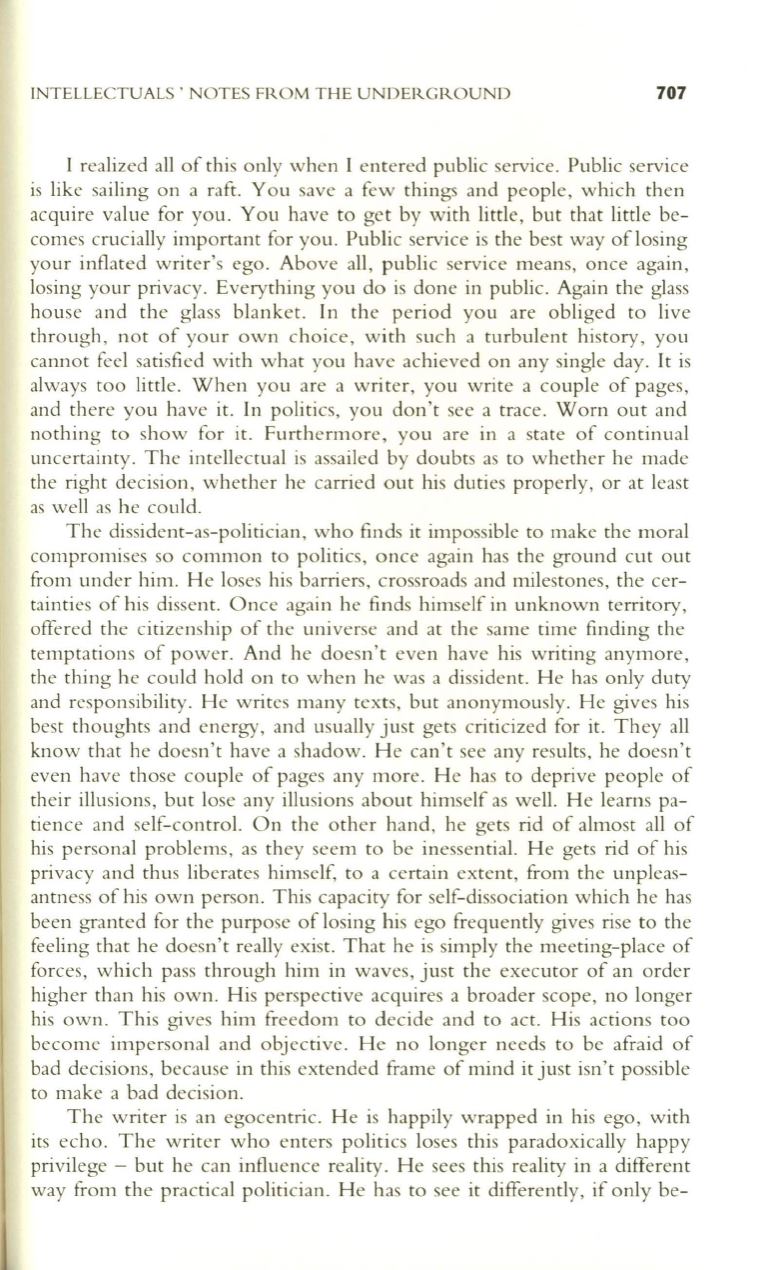
INTELLECTUALS ' NOTES FROM THE UNDERGROUND
707
I realized all of this only when I entered public service. Public service
is like sailing on a raft. You save a few things and people, which then
acquire value for you. You have to get by with little, but that little be–
comes crucially important for you. Public service is the best way of losing
your inflated writer's ego. Above all, public service means, once again,
losing your privacy. Everything you do is done in public. Again the glass
house and the glass blanket. In the period you are obliged to live
through, not of your own choice, with such a turbulent history, you
cannot feel satisfied with what you have achieved on any single day. It is
always too little. When you are a writer, you write a couple of pages,
and there you have it. In politics, you don't see a trace. Worn out and
nothing to show for it. Furthermore, you are in a state of continual
uncertainty. The intellectual is assailed by doubts as to whether he made
the right decision, whether he carried out his duties properly, or at least
as well as he could.
The dissident-as-politician, who finds it impossible to make the moral
compromises so common to politics, once again has the ground cut out
from under him. He loses his barriers, crossroads and milestones, the cer–
tainties of his dissent. Once again he finds himself in unknown territory,
offered the citizenship of the universe and at the same time finding the
temptations of power. And he doesn't even have his writing anymore,
the thing he could hold on to when he was a dissident. He has only duty
and responsibility. He writes many texts, but anonymously. He gives his
best thoughts and energy, and usually just gets criticized for it. They all
know that he doesn't have a shadow. He can't see any results, he doesn't
even have those couple of pages any more . He has
to
deprive people of
their illusions, but lose any illusions about himself as well. He learns pa–
tience and self-control. On the other hand, he gets rid of almost all of
his personal problems, as they seem to be inessential. He gets rid of his
privacy and thus liberates himself, to a certain extent, from the unpleas–
antness of his own person. This capacity for self-dissociation which he has
been granted for the purpose of losing his ego frequently gives rise to the
feeling that he doesn't really exist. That he is simply the meeting-place of
forces, which pass through him in waves, just the executor of an order
higher than his own. His perspective acquires a broader scope, no longer
his own. This gives him freedom to decide and
to
act. His actions too
become impersonal and objective. He no longer needs
to
be afraid of
bad decisions, because in this extended frame of mind it just isn't possible
to make a bad decision.
The writer is an egocentric. He is happily wrapped in his ego, with
its echo. The writer who enters politics loses this paradoxically happy
privilege - but he can influence reality. He sees this reality in a different
way from the practical politician. He has to see it differently, if only be-


